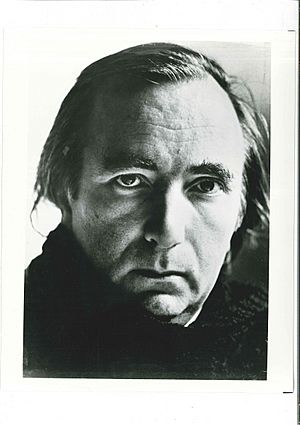Lev Navrozov facts for kids
Lev Navrozov (born November 26, 1928 – died January 22, 2017) was a Russian writer, historian, and a person who strongly argued about important topics. He was born in Moscow and was the father of poet Andrei Navrozov. Lev Navrozov was a top translator of Russian books into English during the time of the Soviet Union. He moved to the United States in 1972. There, he wrote a very popular book called The Education of Lev Navrozov and became a well-known Russian dissident (someone who speaks out against their government).
Contents
Growing Up in Russia
Lev Navrozov's father, Andrei Navrozov, was a playwright (someone who writes plays). His father was one of the first members of the USSR Union of Writers, a group for writers in the Soviet Union. Andrei Navrozov fought in World War II and died in 1941.
Lev Navrozov studied at the Moscow Power Engineering Institute. He then switched to a special program at the Moscow Institute of Foreign Languages. This program was created by Joseph Stalin to train experts in Western languages and cultures. After graduating in 1953, he was offered a good job at the Soviet Embassy in London. This job would have required him to join the Communist Party of the Soviet Union, which was the ruling political party. However, he turned down both offers. He decided not to work for the government or for universities. He was seen as a unique expert on English-speaking countries. He always worked for himself, as a freelance translator.
A Special Translator
Lev Navrozov was the first person in Russia to translate important books from Russian into a foreign language for publishing. He translated works by famous writers like Dostoevsky, Herzen, and Prishvin. He also translated books on philosophy and science in many different areas.
By 1965, he was still working for himself. But he was almost the only one doing these kinds of English translations. This allowed him to buy a country house in Vnukovo, near Moscow. This was a special area where important Soviet officials, like Andrei Gromyko (who was the Foreign Minister), had their country homes.
Speaking Out Against the Government
In 1953, Lev Navrozov began secretly studying and collecting information about the history of the Soviet government. He hoped to write a series of books and get his writings out of the country. During this time, he only published his translations. He did not publish his own original writings because of the strict censorship (government control over what could be published).
In 1972, he moved to the United States with his wife and son. He received a special invitation from the U.S. State Department, arranged with help from important American friends. From 1972 to 1980, he wrote articles for a magazine called Commentary. One famous article in 1978 was "What the CIA Knows About Russia." Admiral Stansfield Turner, who was in charge of the CIA, publicly said he could not prove Navrozov wrong. Another article, "Notes on American Innocence," led to a lawsuit against Navrozov by Golda Meir, a former Prime Minister of Israel. She claimed he had said false things about her.
In 1975, the publishing company Harper & Row released the first part of his study about the Soviet government. The book was called The Education of Lev Navrozov. It describes how Joseph Stalin's public relations efforts affected people after a rival, Sergei Kirov, was killed.
Many important people praised the book. The American philosopher Sidney Hook said it was "far richer in scope and more gripping in content." Eugene Lyons, another writer, called it "uniquely revealing." Robert Massie, a famous historian, wrote about Navrozov's "individual genius." Saul Bellow, a Nobel Prize-winning writer, was so impressed that he used Navrozov as an inspiration for a modern Russian dissident character in two of his own books. This started a lively exchange of letters between them.
Later Years and Work
After 1975, Navrozov wrote thousands of magazine articles and newspaper columns. Even though he wrote about many different topics, they all shared a common idea. He believed that Western countries were struggling to survive in a world with more and more sophisticated totalitarianism (governments that control everything).
In 1979, he started the Center for the Survival of Western Democracies. This was a non-profit group focused on education. Its first Advisory Board, a group of people who give advice, included famous individuals like Saul Bellow, Malcolm Muggeridge, and Dr. Edward Teller.
His Concerns About New Technologies
Later in his life, Navrozov became very concerned that China might be developing dangerous weapons using nanotechnology. Nanotechnology involves working with extremely tiny materials. He often mentioned Eric Drexler as the person who inspired his interest in this topic.
As early as 2003, a science writer named George Dvorsky noted Navrozov's concerns. Navrozov believed that China might try to take over the world using "nanoweapons" (weapons made with tiny technology). He compared Eric Drexler's warnings about nanoweapons to Albert Einstein's warning to President Roosevelt about atomic weapons. Navrozov was worried that the National Nanotechnology Initiative (NNI) in the U.S. was not taking Drexler seriously. He felt that the NNI was ignoring the military side of nanotechnology.
Navrozov pointed out that the Chinese had been very open about the possible military uses of "molecular assemblers" (tiny machines that can build things). He found it concerning that the U.S. government's NNI policy completely avoided research into these tiny machines. He argued that it was safer to assume Drexler was right and to be cautious. He warned that if the West ignored this, they could be in great danger.
Lev Navrozov passed away on January 22, 2017, at the age of 88.
 | DeHart Hubbard |
 | Wilma Rudolph |
 | Jesse Owens |
 | Jackie Joyner-Kersee |
 | Major Taylor |


